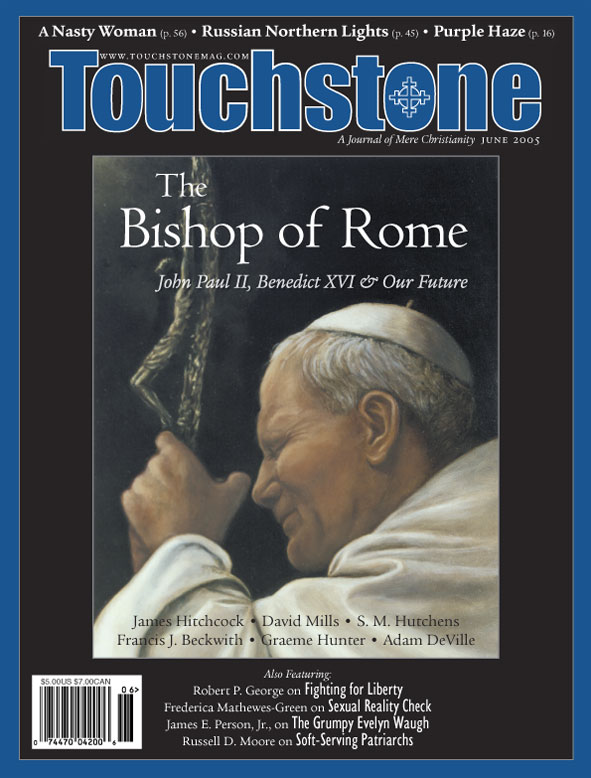View
Muddle America
Joseph M. Knippenberg on Why Red & Blue States Are Really Just a Purple Haze
Yes, we are a 50/50—well, 51/48—nation, Jonathan Rauch conceded in a recent issue of The Atlantic, but contrary to what many partisans and pundits say, the gulf between one side and the other is more like a gully (and perhaps a shallow gully) than a chasm. Following the sociologist Alan Wolfe's analysis in One Nation, After All—written to counter James Davison Hunter's famous Culture Wars—Rauch argues that "ordinary people mix and match values from competing menus." They are, as Wolfe observed, "above all moderate," "reluctant to pass judgment," and "tolerant to a fault."
Divided Elites
While there are recognizable extremes—on the one side, traditionalist Evangelicals who are in the pews every Sunday morning and in the fellowship hall every Wednesday night (who voted overwhelmingly for Bush) and, on the other, progressive secularists who wouldn't know what to do with themselves on Sunday if the New York Times didn't show up (who voted just as overwhelmingly for Kerry)—most Americans are firmly ensconced in the middle. As political scientist Morris Fiorina argues in Culture War? The Myth of a Polarized America, public opinion is closely, not deeply divided, resembling a bell curve much more than a bimodal dumbbell.
Why, then, the constant "culture war" drumbeat? According to Rauch, political and opinion elites are deeply divided, despite the fact that the rest of us aren't. The unintended consequence of the democratizing political reforms of the 1960s and 1970s was the rise of "candidate-centered" politics, which permitted those passionately devoted to particular policy positions to thrust themselves onto center stage. As a result, parties have become increasingly ideologically homogeneous, with liberal Republicans and conservative Democrats equally endangered species.
Further, with the art of partisan redistricting having become a computer-assisted science, politicians have been able to fashion echo chambers for themselves. Republicans represent largely conservative districts and Democrats largely liberal districts, each with little need to reach out to the other side in order to build a winning electoral coalition.
Most pundits gravitate toward this line of argument, either because they themselves are also ideologically pure (theoretical coherence is at least an aspirational hallmark of intellectual life, even if conformity to the real world isn't) or because conflict offers a more compelling and marketable storyline than consensus. (Rauch is the exception that proves the rule: His effort to stir up the oil underlying the troubled waters amounts to an attempt to put himself at odds with, in conflict with, the conventional wisdom.)
To be charitable, however, I wouldn't argue that Rauch wants to shout: "Look at me! I'm different!" He wants us to calm down and think about the capacity of our political system to accommodate and compromise on divergent points of view. Thus, in his conclusion he points to a paradox: "Though you would be partly correct to say that the mainstream parties have been taken over by polarized activists, you could also say, just as accurately and a good deal more cheerfully, that polarized activists have been taken over by the mainstream parties" (my emphasis).
Extremists who are co-opted acquire a stake in the system; they write speeches and compose party platforms rather than throw bombs. They eventually become responsible, willing to accept half a loaf, rather than massacring those who are dining in the mess hall.
Unstable Americans
I am nonetheless suspicious of Rauch's line of argument, not because I don't think it is an apt description of the current state of much of American public opinion, but because I'm not confident of its stability. What Rauch, Wolfe, and Fiorina celebrate as moderation, I'm tempted to call confusion. We Americans are not notably deep thinkers, an observation that goes back at least as far as Tocqueville, and a fact that is celebrated from time to time by conservatives and neo-conservatives suspicious of theoretical abstraction.
We may be "stupid," so the argument goes, but at least we're commonsensical. Would that that were so! When we mix and match our political opinions from the menus offered by political parties and public intellectuals, we sometimes choose opinions that are ultimately inconsistent with one another. We are "personally opposed to abortion," but support "a woman's right to choose." We are environmentalists who love the safety and flexibility of big SUVs. We want lower taxes but are unwilling to give up the government programs from which
we benefit.
Abraham Lincoln (actually Christ) had a word (actually a sentence) for this: "A house divided against itself cannot stand." If "our" moderation is in fact the confused holding of ultimately contradictory opinions, then sooner or later one or the other tendency is likely to prevail.
This outcome was indeed the hope of those liberal rationalists who availed themselves of religious language. By focusing on a worldly goal like "the relief of man's estate," they hoped to transform religion into an instrument of liberal rationalism, which seems indeed to have been the fate of some of the mainline denominations. Our current "moderation" may be the harbinger of a deeper immoderation down the road.
Let me offer two examples of what I have in mind. One comes straight from Rauch's article, where, as an example of moderate mixing and matching, he offers support for both stem-cell research (a "liberal" position) and school vouchers (a "conservative" position). Support for vouchers can indeed be couched in conservative terms, emphasizing parental authority and the integrity of the family as the fundamental social unit. But it can also be articulated in liberal terms and reconciled with liberal support for stem-cell research; the underlying rationale would be individual autonomy, power,
and choice.
Indeed, it often happens that there is a rationale underlying "mixing and matching": I, the sovereign individual, am the chooser. The coherence of my position comes from my will, not from its conformity to "the world," or "natural law," or "common grace."
My other example comes from the now-famous battle over Baylor University. The pre-Baylor 2012, pre-Robert Sloan vision of the institution amounts to a melding of conventional secular academic disciplines and a "religious atmosphere." Here is how Baylor's Provost Emeritus, Donald Schmeltekopf, explained it in The Baptist and Christian Character of Baylor, a fine collection of faculty essays:
A common way of expressing Baylor's purpose, under [the atmospheric] model, was to say that Baylor offered an excellent education in a "Christian environment." Abner V. McCall, as Chancellor . . . wrote: "The description 'Christian' should imply that all who operate our institutions should strive to give the quality of excellence. . . . Further, when we designate our institutions as 'Christian,' we profess that their services are rendered in a Christian manner—with respect, concern, compassion, and love."
Schmeltekopf goes on to argue that this is an unstable mixture:
A Christian atmosphere, as important as it is in the ethos of an institution, cannot by itself withstand the overwhelming onslaught of academic secularization. Following an all-too-familiar pattern, the Christian college or university which does not integrate faith and learning will eventually collapse from
within.
Ad Hoc Moderation
To state my point one last way: It isn't clear to me that our moderation is either a moderation of principle (Rauch's view) or a moderation of non-ideological common sense (the view of many conservatives.)
For examples of the former, I can point to Abraham Lincoln, who was as convinced of the evil of slavery as he was patient regarding its abolition, and to Immanuel Kant (not a predictable example, to be sure), who enjoined us, following Scripture, to be as wise as serpents and as harmless as doves. Both Lincoln and Kant were aware of human finitude and fallibility. And both had hopes for a providential or historical guarantee of justice beyond merely human fashioning.
Both the moderation of principle and the moderation of common sense are at least potentially stable in a way that a moderation born of confusion and ad hoc choices is not. I fear that our moderation is unstable because it is unprincipled, or rather, because it is ultimately immoderate. Its most culturally compelling element, at the moment, is sovereign individual choice, which recognizes no limits and is by definition infallible.
In an effort to preserve us for "the better angels of our natures," I will continue to put my shoulder to the wheel on one side, pointing to a foundation that combines a fallible recognition of limits with a faith in ultimate redemption. When we recognize that we are not the authors of our world, that we see through a glass but darkly, we can accommodate different prudential judgments, understanding how reasonable (but fallible) people can disagree and recognizing that there is good to be found and a lesson to be learned even when, politically, we lose.
The ground, in other words, of genuine political moderation is faith, not in ourselves, or in our capacity to choose, or in political institutions that compel us to "split the difference," but in God. In his "Farewell Address," George Washington observed that "virtue or morality is a necessary spring of popular government" and insisted that it could not be sustained without religion. Those words were true over two hundred years ago. They remain true today.
Joseph M. Knippenberg is Professor of Politics and Director of the Rich Foundation Urban Leadership Program at Oglethorpe University in Atlanta, Georgia. He is also an Adjunct Fellow of the Ashbrook Center for Public Affairs, on whose website (www.ashbrook.org) and weblog (www.noleftturns.ashbrook.org) he frequently posts.
subscription options
Order
Print/Online Subscription

Get six issues (one year) of Touchstone PLUS full online access including pdf downloads for only $39.95. That's only $3.34 per month!
Order
Online Only
Subscription

Get a one-year full-access subscription to the Touchstone online archives for only $19.95. That's only $1.66 per month!
bulk subscriptions
Order Touchstone subscriptions in bulk and save $10 per sub! Each subscription includes 6 issues of Touchstone plus full online access to touchstonemag.com—including archives, videos, and pdf downloads of recent issues for only $29.95 each! Great for churches or study groups.
Transactions will be processed on a secure server.
more from the online archives
calling all readers
Please Donate
"There are magazines worth reading but few worth saving . . . Touchstone is just such a magazine."
—Alice von Hildebrand
"Here we do not concede one square millimeter of territory to falsehood, folly, contemporary sentimentality, or fashion. We speak the truth, and let God be our judge. . . . Touchstone is the one committedly Christian conservative journal."
—Anthony Esolen, Touchstone senior editor









